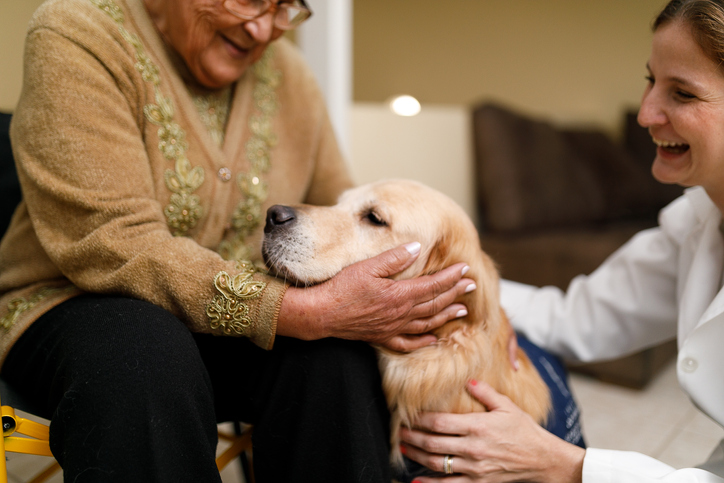By Michael Beattie, LSW
Experts say veterinary social work is a growing field. “Veterinary social work is an interprofessional practice that includes animal assisted therapy, but is broader than animal assisted therapy,” Elizabeth Strand said during an episode of NASW Social Work Talks podcast on veterinary social work.
There are many career opportunities for social workers hoping to enter the field of veterinary social work.
The University of Tennessee (U.T.) established the first veterinary social work program in the1980s through a partnership with the school’s veterinary college. U.T. maintains a national registry of veterinary social workers, which can be used by students from any college seeking a field placement. Most students in the certificate program receive an MSSW from U.T., but the school also offers a post-graduate program.

Learn about the University of Tennessee’s Veterinary Social Work program
Veterinary social work includes four sub-fields including the relationship between human and animal violence, grief and loss, animal assisted interventions, and compassion fatigue.
Interest in the relationship between human on animal violence and human to human violence stems from the fact that (1) animal abuse by children is a red flag for future violence against humans and (2) giving away a pet is frequently a harbinger of a suicide attempt.
The University of Denver School of Social Work leads the nation in research into animal assisted interventions. The school offers certificates in Canine Assisted Interventions, Animals and Human Health, and Human-Animal-Environment Interaction. Each certificate is geared for working professionals and consists of three online courses plus a field placement. Enrolling in a short continuing education class from the University of Denver can be a way to discover if the field is a good fit for you.
Learn about the Institute for Human-Animal Connection at the University of Denver’s Graduate School of Social Work.
Volunteering provides one avenue to gain experience in veterinary social work. Nursing homes and hospitals accept volunteers for pet visitation programs. You can become a certified handler and your pet can become a therapy dog through petpartners.org. Faith organizations frequently use volunteers with certified dogs to provide comfort to victims of mass shootings and natural disasters. Many libraries use volunteer therapy dogs to encourage children to read to pets.
Social workers in veterinary hospitals serve a similar role to their counterparts in human hospitals and hospices by helping families cope with grief and loss, assisting clients with treatment decision making, and running support groups. For example, they comfort families when a pet is euthanized. Due to high rates of compassion fatigue among veterinary staff, veterinary social workers also provide counseling to staff.
Veterinary social workers also work in child welfare, schools, and non-profit management.
For example, after earning her MSW and certificate in veterinary social work at the University of Tennessee, Shakesha Alexander became director of Animal Assisted Interventions for the River Rouge School District, a public school system outside of Detroit, Michigan.
In an interview with the Humane Society of the United States Alexander, who has started quite a few programs where animals interact with children and adults, said, “the animals are a vehicle for conversation.” The programs help people open up.
“Sometimes they don’t know my name, but they know the dogs’ names. I don’t care. I could be Doctor Dolittle or the Dog Lady, whatever they want to call me. I’m just happy to bring joy.”
One way into the field is through joining the International Association of Veterinary Social Workers which offers an annual conference, continuing education, and a reduced membership fee for students.
Even for those who don’t want to specialize in veterinary social work being somewhat knowledgeable in this field would be beneficial if your career plans include working with people with autism, eating disorders, or veterans.
Equine therapy has shown to be especially helpful for treating eating disorders and people who have experienced a traumatic brain injury. Service dogs have proven highly helpful to people experiencing autism to develop social skills and enabling veterans cope with PTSD. After the passage of the PAWS Act (Puppies Assisting Wounded Servicemembers) in 2021 utilization of service dogs will grow rapidly and indirectly create job opportunities for social workers knowledgeable of the human-animal bond.
Where a client has a strong affection for animals, every social worker should know enough about community services to make a referral a local Animal Assisted Interventions program.
For more information, visit Veterinary social workers | HumanePro by The Humane Society of the United States.
Disclaimer: The National Association of Social Workers invites members to share their expertise and experiences through Member Voices. This blog was prepared by Michael Beattie, LSW, in his personal capacity and does not necessarily reflect the view of the National Association of Social Workers.
Michael Beattie is an LSW and outpatient therapist at National Counseling Group in Annandale, Va. He can be reached at michaelbeattie@yahoo.com.




